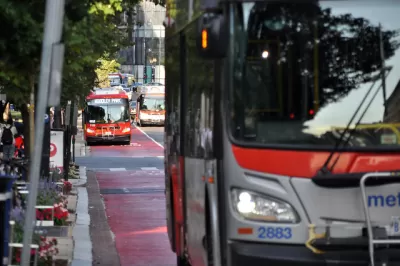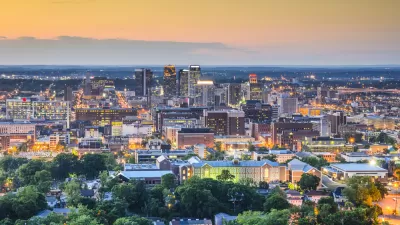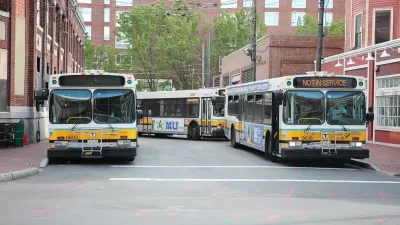The kit, designed in collaboration with five U.S. cities, aims to provide lessons and tools for building a compelling case for bus priority and identifying measurable benefits.

The Natural Resources Defense Council (NRDC) and the Bloomberg Philanthropies American Cities Climate Challenge have released a Bus Priority Toolkit "created jointly with Nelson\Nygaard, NACTO, and the cities of Atlanta, Honolulu, Los Angeles, Portland, Ore., and Washington, D.C.," write Zak Accuardi and Jordan Fraade. The toolkit is designed "to help planners and policy makers at cities and transit agencies solve two key two key bus priority implementation challenges: 1) Building the case for bus priority infrastructure by identifying effective ways to tell the story about why bus priority measures are key tools for climate, transportation access, and equity; and 2) Evaluating the benefits and performance of bus priority measures once they have been implemented."
"Dedicated bus lanes and other transit priority measures are becoming increasingly common in the U.S., but cities working to implement them in recent years have often faced similar challenges as they work to scale up impact from small, one-off projects to comprehensive investments." Because of this, "implementation is easier when cities and transit advocates can communicate the benefits of bus priority measures as part of a clear and compelling story" with a "rigorous performance measurement strategy."
According to the authors, "[t]he technology isn’t complicated, and what’s often missing is simply a compelling narrative, a strategy to measure and communicate the positive benefits, and political will." The kit "provides graphic elements to help tell the story of the benefits of bus priority projects as well as analytic methods for use by city and transit agency staff."
FULL STORY: New Toolkit Supports Bus Priority Implementation

Alabama: Trump Terminates Settlements for Black Communities Harmed By Raw Sewage
Trump deemed the landmark civil rights agreement “illegal DEI and environmental justice policy.”

Study: Maui’s Plan to Convert Vacation Rentals to Long-Term Housing Could Cause Nearly $1 Billion Economic Loss
The plan would reduce visitor accommodation by 25% resulting in 1,900 jobs lost.

Why Should We Subsidize Public Transportation?
Many public transit agencies face financial stress due to rising costs, declining fare revenue, and declining subsidies. Transit advocates must provide a strong business case for increasing public transit funding.

Wind Energy on the Rise Despite Federal Policy Reversal
The Trump administration is revoking federal support for renewable energy, but demand for new projects continues unabated.

Passengers Flock to Caltrain After Electrification
The new electric trains are running faster and more reliably, leading to strong ridership growth on the Bay Area rail system.

Texas Churches Rally Behind ‘Yes in God’s Back Yard’ Legislation
Religious leaders want the state to reduce zoning regulations to streamline leasing church-owned land to housing developers.
Urban Design for Planners 1: Software Tools
This six-course series explores essential urban design concepts using open source software and equips planners with the tools they need to participate fully in the urban design process.
Planning for Universal Design
Learn the tools for implementing Universal Design in planning regulations.
Caltrans
Smith Gee Studio
Institute for Housing and Urban Development Studies (IHS)
City of Grandview
Harvard GSD Executive Education
Toledo-Lucas County Plan Commissions
Salt Lake City
NYU Wagner Graduate School of Public Service





























